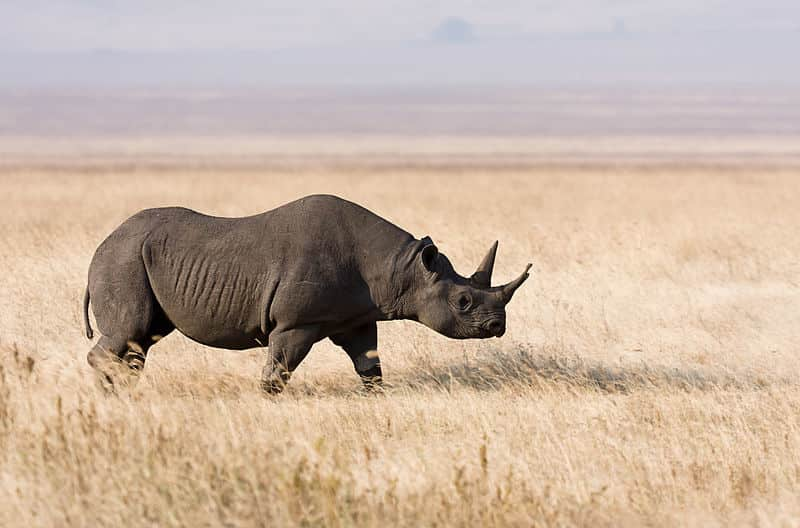Texas Hunter Pays $350,000 to Harvest Rare Black Rhino in Namibia
OutdoorHub Reporters 05.21.15

Nearly a year and a half ago the Dallas Safari Club (DSC) put a rare chance to hunt a black rhino in Namibia up for auction, a decision that the organization said would pump hundreds of thousands of dollars into conservation for the species.
The DSC said that funds from the hunt of the bull (which was no longer of breeding age and was dangerous to young males) will go toward patrol vehicles and training that local wardens needed to prevent criminal poaching.
Nevertheless, the auction was highly controversial.
Animal rights organizations opposed the idea of hunting for conservation and petitioned US authorities to stop the hunt. When Texas hunter Corey Knowlton won the permit with a bid of $350,000, he faced both heated criticism and even death threats. Despite the scrutiny, however, Knowlton pushed on and finally harvested the rhino on May 18.
“I felt like from day one it was something benefiting the black rhino,” Knowlton told CNN after the harvest. “Being on this hunt, with the amount of criticism it brought and the amount of praise it brought from both sides, I don’t think it could have brought more awareness to the black rhino.”
Knowlton’s hunt took several days before the final confrontation with the 3,000-pound beast. You can see video of the hunt below.
The rhino hunt reportedly carried the highest price ever paid for a big game permit in Africa. That is not surprising, seeing as how black rhinos are considered critically endangered. While the species was once the most numerous of all rhinoceroses, conservationists believe that there are only about 5,000 black rhinos left in the world today—2,000 of which live in Namibia. The southern African nation sells about five rhino permits every year and targets only older bulls.
The main danger to Namibia’s rhino population are poachers, who kill thousands of the rhinos across Africa every year. Rhino horn draws such a high price that poachers have been known to use helicopters and other sophisticated equipment to kill their targets, while those relying on more traditional methods often poison watering holes. To combat these criminals, Namibia’s Ministry of Environment and Tourism says it needs more funds.
“We are putting a lot of effort into capacity building of our staff, formal and in-service training, equipping our staff with up-to-date equipment, and making use of technology (including unmanned aerial vehicles, closed-circuit television surveillance and radio-frequency identification tags),” Elly Hamunyela, deputy director for the agency, told DSC. “Rhino conservation is very expensive as we all know. As a small example, on average to immobilize a rhino, fit it with security devices and DNA typing costs US$1,800 to US$2,300. We immobilize more than 100 rhinos on a yearly basis!”
Some of those funds come from hunters like Knowlton. His hunt was conducted under the guidance of professional guide Hentie van Heerden, who led him to one of the 18 rhino bulls that the Ministry of Environment and Tourism had previously designated for harvest. According to van Heerden, there are few activists in Namibia that oppose the hunt because they know it benefits the rhino population as a whole.
“There will always be activists and that’s how they make their money,” he said. “They have no clout here in Namibia, because people understand hunting.”
According to experts, culls are perfectly normal parts of Namibia’s rhino management program. The only difference is that instead of hiring sharpshooters, Namibian officials would rather auction the hunt to hunters in order to fund the continued conservation of the black rhino. Typically, a rhino permit goes for about $175,000 to $223,000.

